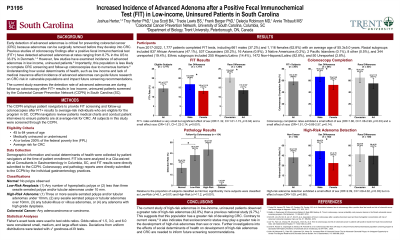Tuesday Poster Session
Category: Colorectal Cancer Prevention
P3195 - Increased Incidence of Advanced Adenoma After a Positive Fecal Immunochemical Test in Low-Income Uninsured Patients
Tuesday, October 24, 2023
10:30 AM - 4:00 PM PT
Location: Exhibit Hall

Has Audio
- JH
Joshua Herter
Center for Colon Cancer Research, University of South Carolina
Columbia, SC
Presenting Author(s)
Troy Herter, PhD, Lisa Scott, BA, Joshua Herter, , Tracie Lewis, MS, Frank Berger, PhD, Delecia Robinson, MD, Annie Thibault, MS
Center for Colon Cancer Research, University of South Carolina, Columbia, SC
Introduction: Early detection and removal of advanced adenomas is critical for preventing colorectal cancer (CRC). Studies of colonoscopy findings after a positive fecal immunochemical test (FIT+) have found advanced adenomas in 9% to 33% of FIT+ patients with access to universal screening programs or private insurance. However, detection rates of advanced adenoma have not been examined in low-income, uninsured patients who are less likely to comply with CRC screening guidelines. The current study examines the incidence of advanced adenomas found during colonoscopy after a FIT+ in low-income, uninsured patients who were screened through the Colorectal Cancer Prevention Network (CCPN) screening program in South Carolina.
Methods: Patients were eligible for the screening program if they were 45-64 years old, at/below 200% of the federal poverty line, uninsured, and average risk for developing CRC. Colonoscopy findings after a FIT+ were categorized as (1) Normal: no polyps; (2) Low Risk Neoplasia: any number of hyperplastic polyps, less than three sessile serrated polyps under 10mm, or less than three tubular adenomas under 10mm; (3) Advanced Adenoma: three or more sessile serrated polyps under 10mm, three or more tubular adenomas under 10mm, any sessile serrated polyps or tubular adenomas over 10mm, any tubulovillous or villous adenomas, or any adenoma with high grade dysplasia; or (4) Colorectal Cancer: any adenocarcinoma or carcinoma.
Results: From 2017-2021, 1,777 patients who were eligible to participate in the CCPN screening program completed FIT tests, resulting in 261 FIT+ tests (15%). Of the FIT+ patients, 154 (59%) completed a follow-up colonoscopy; 32 (20%) had Normal findings, 58 (38%) had Low Risk Neoplasia, 62 (40%) had Advanced Adenoma, and 2 (1%) had CRC.
Discussion: Compared to patients with access to universal screening programs or private insurance, our results indicate that low-income, uninsured patients are (1) less likely to complete follow-up colonoscopy after a FIT+ and (2) more likely to have advanced adenomas after a FIT+. These results underscore the importance of providing access and improving compliance with colonoscopy after a FIT+ result in low-income, uninsured patients. They also suggest that low income and lack of insurance should be considered as potential risk factors for advanced adenoma and CRC.
Disclosures:
Troy Herter, PhD, Lisa Scott, BA, Joshua Herter, , Tracie Lewis, MS, Frank Berger, PhD, Delecia Robinson, MD, Annie Thibault, MS. P3195 - Increased Incidence of Advanced Adenoma After a Positive Fecal Immunochemical Test in Low-Income Uninsured Patients, ACG 2023 Annual Scientific Meeting Abstracts. Vancouver, BC, Canada: American College of Gastroenterology.
Center for Colon Cancer Research, University of South Carolina, Columbia, SC
Introduction: Early detection and removal of advanced adenomas is critical for preventing colorectal cancer (CRC). Studies of colonoscopy findings after a positive fecal immunochemical test (FIT+) have found advanced adenomas in 9% to 33% of FIT+ patients with access to universal screening programs or private insurance. However, detection rates of advanced adenoma have not been examined in low-income, uninsured patients who are less likely to comply with CRC screening guidelines. The current study examines the incidence of advanced adenomas found during colonoscopy after a FIT+ in low-income, uninsured patients who were screened through the Colorectal Cancer Prevention Network (CCPN) screening program in South Carolina.
Methods: Patients were eligible for the screening program if they were 45-64 years old, at/below 200% of the federal poverty line, uninsured, and average risk for developing CRC. Colonoscopy findings after a FIT+ were categorized as (1) Normal: no polyps; (2) Low Risk Neoplasia: any number of hyperplastic polyps, less than three sessile serrated polyps under 10mm, or less than three tubular adenomas under 10mm; (3) Advanced Adenoma: three or more sessile serrated polyps under 10mm, three or more tubular adenomas under 10mm, any sessile serrated polyps or tubular adenomas over 10mm, any tubulovillous or villous adenomas, or any adenoma with high grade dysplasia; or (4) Colorectal Cancer: any adenocarcinoma or carcinoma.
Results: From 2017-2021, 1,777 patients who were eligible to participate in the CCPN screening program completed FIT tests, resulting in 261 FIT+ tests (15%). Of the FIT+ patients, 154 (59%) completed a follow-up colonoscopy; 32 (20%) had Normal findings, 58 (38%) had Low Risk Neoplasia, 62 (40%) had Advanced Adenoma, and 2 (1%) had CRC.
Discussion: Compared to patients with access to universal screening programs or private insurance, our results indicate that low-income, uninsured patients are (1) less likely to complete follow-up colonoscopy after a FIT+ and (2) more likely to have advanced adenomas after a FIT+. These results underscore the importance of providing access and improving compliance with colonoscopy after a FIT+ result in low-income, uninsured patients. They also suggest that low income and lack of insurance should be considered as potential risk factors for advanced adenoma and CRC.
Disclosures:
Troy Herter indicated no relevant financial relationships.
Lisa Scott indicated no relevant financial relationships.
Joshua Herter indicated no relevant financial relationships.
Tracie Lewis indicated no relevant financial relationships.
Frank Berger indicated no relevant financial relationships.
Delecia Robinson indicated no relevant financial relationships.
Annie Thibault indicated no relevant financial relationships.
Troy Herter, PhD, Lisa Scott, BA, Joshua Herter, , Tracie Lewis, MS, Frank Berger, PhD, Delecia Robinson, MD, Annie Thibault, MS. P3195 - Increased Incidence of Advanced Adenoma After a Positive Fecal Immunochemical Test in Low-Income Uninsured Patients, ACG 2023 Annual Scientific Meeting Abstracts. Vancouver, BC, Canada: American College of Gastroenterology.

